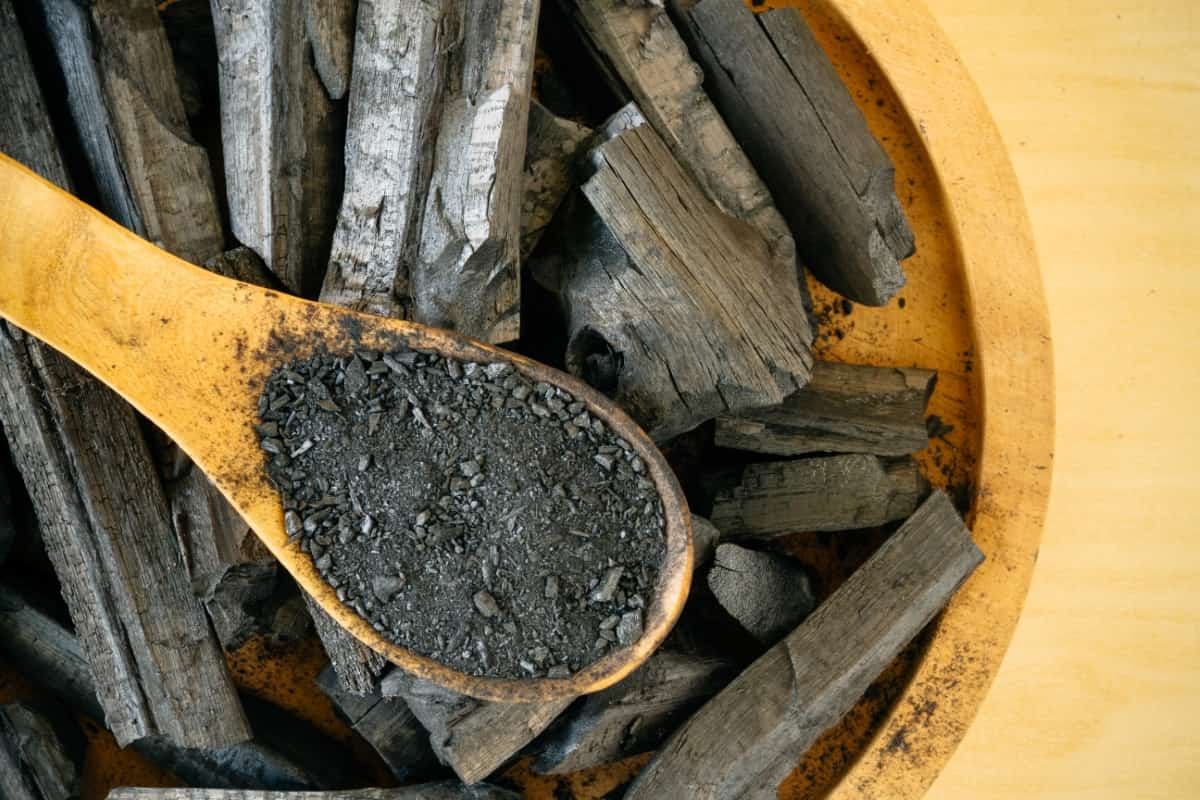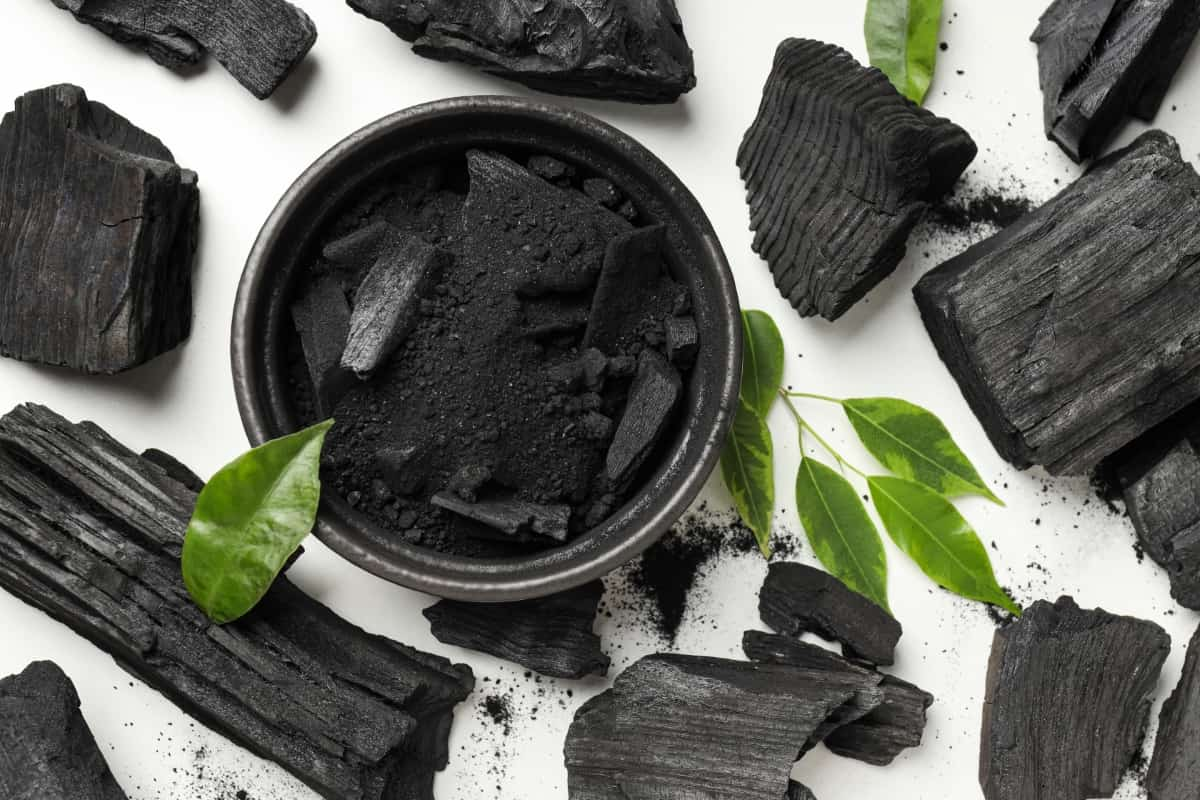Natural materials such as charcoal can provide many benefits to plants planted in pots, including improved drainage, reduced soil-borne diseases, and improved overall plant health. This article explores the benefits of using charcoal in potted plants and how you can use it in your gardening routine to reap these benefits.

15 Benefits of Charcoal for Garden Plants
Improves Soil Structure and Drainage
When applied as a soil amendment, charcoal can significantly improve soil structure and drainage. Charcoal creates large pore spaces in soil, which allow better water infiltration and air circulation. Charcoal’s porous structure acts as a sponge, absorbing excess moisture and gradually releasing it over time. In addition to reducing erosion and soil compaction, charcoal can also help reduce soil compaction.
It Can Help to Prevent Water from Evaporating Too Quickly
To prevent the rapid evaporation of water, charcoal can be used. This can be particularly useful when there is a lack of water in hot, dry climates. In addition to promoting healthy plant growth, charcoal can reduce the risk of drought stress by retaining moisture in the soil.
Charcoal Can Help to Balance the pH of the Soil
It has been used as a soil amendment for many years as a natural substance known as charcoal. Aside from balancing the soil’s pH, it has many other benefits. An acidic or alkaline soil can hinder the availability of nutrients to plants, making it difficult for them to grow. This is where charcoal comes into play. Due to its neutral pH, charcoal can help to balance the soil’s pH and make it more hospitable for plants.
Charcoal Mulch
Mulching doesn’t always require brown or green plant material. Mulching with black charcoal can be equally effective. A protective covering is created over the soil surface, preventing moisture from escaping. In this way, weeds are prevented from growing. You can create a different look and highlight a freshly done patch in your garden by layering charcoal as mulch around light-colored plants.
Provides Long-Lasting Nutrients
Using charcoal in the garden increases the soil’s cation exchange capacity, one of its key benefits. The soil will be able to hold onto nutrients such as calcium, magnesium, and potassium, which are essential for plant growth and development. In addition to calcium, magnesium, and phosphorus, charcoal also contains several micronutrients that can benefit plant growth. Over time, these nutrients slowly release into the soil, providing a steady source of plant nutrition.
Promotes Healthy Microbial Activity
Microbial activity is promoted by charcoal because it provides a source of carbon. During the combustion process, charcoal provides food for microorganisms, which use it to multiply and grow. In turn, this increases the soil microorganism population.
In case you missed it: Create an Enchanting Garden with These Top 10 Fast-Growing Perennials

Charcoal Acts as a Natural Pesticide
With charcoal applied to the soil, fungi, and bacteria are prevented from growing, which is responsible for many plant diseases. Furthermore, charcoal keeps soil moist, which is crucial to plant growth. Charcoal can also be sprayed on leaves to repel insects besides its soil benefits. Water and a small amount of vegetable oil can be mixed with charcoal powder to spray. Using a spray bottle, apply the mixture to the leaves of the plants. The benefits of using charcoal as a natural pesticide include its safety for the environment and the fact that it does not harm bees or butterflies.
Charcoal Reduces Plant Stress
When stressed, plants are susceptible to damage and disease, and their growth and productivity are reduced. There are several ways in which charcoal can reduce plant stress. The soil’s ability to water and nutrient retention can improve soil quality. As a result, plants can better withstand droughts and other stresses. Plants can benefit from charcoal by reducing the effects of high temperatures. Keeping plants cooler and reducing heat stress is possible with charcoal because it reflects sunlight and reduces the heat that plants absorb when exposed.
Charcoal Improves Seed Germination
The porous nature of charcoal helps improve the structure of the soil. When used in soil, charcoal can create air pockets facilitating water drainage and root growth. Seeds can germinate more easily when soil is improved because it provides ideal growing conditions. As well as improving seed germination, charcoal reduces soil-borne diseases. The natural antibacterial properties of charcoal can prevent harmful bacteria from growing in soil. As a result, seedling diseases can be reduced, and overall plant health can be improved.
It Increases Plant Growth and Productivity
Pyrolysis is the process of burning organic material without oxygen to produce charcoal. Soil amendments made from this material are highly porous and have a high surface area. Charcoal can improve soil fertility, which is one of its main benefits. The carbon in charcoal is an essential nutrient for plant growth. Charcoal increases the organic matter in the soil, improving its structure and fertility when added to it. As a result, plants grow and produce more.
Filling Your Pot Bottom
Using charcoal at the bottom of your container instead of heavy-weight rocks and pebbles reduces your pot’s weight, allowing you to lift or move it easily. Charcoal is porous and lightweight, so it reduces your pot’s weight. Regarding soil additives, this is a real boon for terrace gardeners.
Removes Bad Odours in Soil and Compost
To reduce the foul odors that may arise during composting, sprinkle the Charcoal powder over your compost. When added to potting soil, charcoal absorbs the nauseating odors of compost and manure while maintaining the mix’s nutritional value.
Garden Décor
You can create a unique garden look by adding a layer of small charcoal pieces as mulch, especially around light-colored plants.
Herbicide Neutralization
Often, herbicides hang out in the soil for a long time. Even though the target plants have died, they persist for quite a while afterward. As a result, your future crops will grow in an unfavorable environment. If you intend to plant in an area subjected to Isoxaben or Oryzalin herbicides, add some hardwood charcoal to the soil before planting. In this way, herbicides will be diluted, and growth problems preventing optimal plant development will be prevented.
Anti-Fungal Protection
It is an effective strategy to reduce the incidence of fungal infections in plants by adding charcoal to the soil. Charcoal is one of the most effective methods for killing mold’s mycotoxins. Your garden will surely be protected against fungal infections if you use it.
In case you missed it: How to Make and Use Brahmasthra Organic Pesticide for Your Garden Plants

Conclusion
Using charcoal in your garden has many benefits, including improving soil quality and promoting plant growth. Consider incorporating it into your gardening routine to see the benefits for yourself.
- Feed Your Flock for Less: Top 10 Tips to Save on Chicken Feed
- Ultimate Guide to Ossabaw Island Hog: Breeding, Raising, Diet, and Care
- Hatching Answers: The Top 10 Reasons Your Chickens Aren’t Laying Eggs
- Eggs and Economics: Breaking Down the Cost of Raising Backyard Chickens
- Defend Your Greens: Proven Methods to Keep Iguanas Out of Your Garden
- Ultimate Guide to Cinnamon Queen Chicken: A Comprehensive Guide for Beginners
- Ultimate Guide to California Tan Chicken: Breeding, Raising, Diet, Egg-Production and Care
- Ultimate Guide to Marsh Daisy Chicken: Breeding, Raising, Diet, and Care
- 10 Types of Chicken Farming Businesses You Can Start for Profits